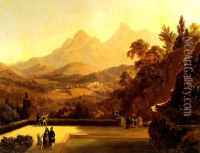Ludwig Heinrich Theodor Gurlitt Paintings
Ludwig Heinrich Theodor Gurlitt, born on March 8, 1855, in Nischwitz, Thallwitz, near Leipzig, Germany, was a notable composer, conductor, and music educator of his time, albeit less widely known today outside of musicology and specific scholarly circles. Gurlitt's contributions to the music world during the late 19th century, though not as universally recognized as those of his contemporaries, were nonetheless significant within the context of the Romantic period's musical evolution.
Coming from a family with strong cultural and intellectual roots—his ancestors included prominent figures in the arts and academia—Gurlitt was immersed in an environment that valued and nurtured artistic and intellectual pursuits from a young age. This background undoubtedly played a pivotal role in shaping his career and artistic output. He pursued his musical education at some of the premier institutions of his time, which further honed his skills and informed his compositional style.
Throughout his career, Gurlitt composed a variety of works, including operas, symphonies, chamber music, and pieces for solo instruments. His music is characterized by its melodic richness and the romantic warmth typical of the era, yet it also exhibits a distinct clarity and formality, reflecting the influence of earlier classical traditions. Despite the quality and breadth of his work, Gurlitt's music did not achieve the same level of fame and enduring popularity as that of some of his contemporaries. This relative obscurity can be attributed to various factors, including the competitive nature of the music scene during his lifetime and the shifting trends in musical taste and style that occurred in the years following his death.
Gurlitt was also committed to music education, believing in the importance of nurturing the next generation of musicians. He held teaching positions at several prestigious institutions, where he was highly regarded for his pedagogical skills and his dedication to his students. Through his teaching, Gurlitt had a lasting impact on the musical landscape, influencing many young musicians who would go on to have successful careers of their own.
Ludwig Heinrich Theodor Gurlitt's life was cut short when he died on April 19, 1897, in Altona, which is now part of Hamburg, Germany. Despite his relatively short life and the subsequent obscurity of much of his work, Gurlitt's contributions to the music world continue to be appreciated by those who explore the depths of the Romantic era's musical heritage. His compositions, though not as frequently performed as those of some of his peers, remain a testament to his talent and the vibrant musical culture of his time.

